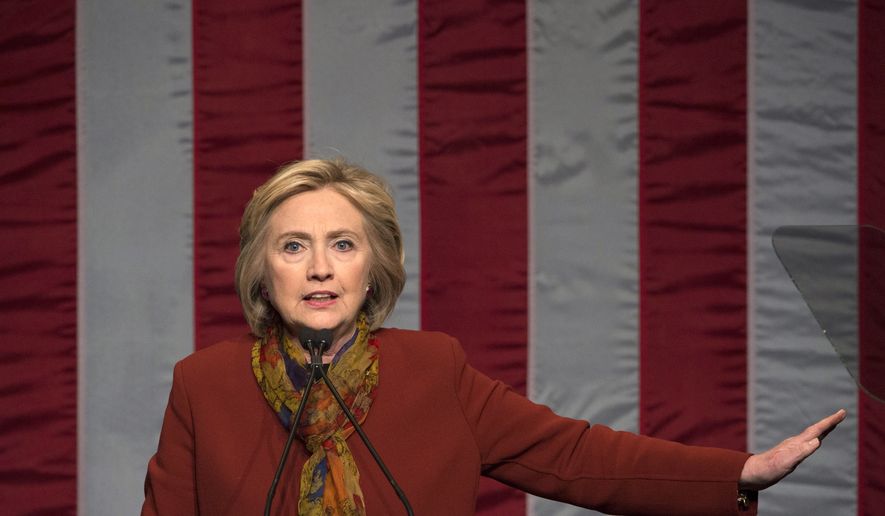OPINION:
Since the Hillary Clinton private server email scandal hit the front pages, parts of the story have become clearer while other parts have been obfuscated.
First, the clear part: It appears that, for several years, Mrs. Clinton’s top aides removed the classification labels, and/or cut and pasted paragraphs from highly classified documents and reports, then transmitted them to her — and Mrs. Clinton responded. Mrs. Clinton had to know about this practice as she requested it be done on occasion. These practices violate the most basic requirements for handling any category of classified information.
Her weak — but lawyerly worded — response that she never received or sent information “marked classified” tells it all — they simply took the labels off or otherwise ignored them. As such, Mrs. Clinton — and her aides — engaged in an extended pattern of misconduct that would have gotten them fired, disciplined (with their clearances lost or suspended), or prosecuted — that is, if they had been “ordinary” federal employees.
In this context, it is ironic that during the Obama administration there have been markedly increased prosecutions for unauthorized disclosures of classified information, especially disclosures that were politically embarrassing. However, these prosecutions were against lower-level employees.
There have been a few “high-ranking” prosecutions for security violations over the years:
Retired Army Gen. and former Obama administration CIA Director David Petraeus pleaded guilty in federal court for mishandling classified information when he gave a bunch of it to his then-girlfriend and biographer.
As he was preparing to testify before the 9/11 Commission, Bill Clinton’s national security adviser, the late Sandy Berger, stole classified documents from the National Archives (he hid them in his socks). Berger likely removed and destroyed original, uncopied and un-inventoried documents, so it could be surmised that they pertained to early warnings of the Sept. 11 attacks. Berger pleaded guilty in federal court and later relinquished his license to practice law.
John Deutch, Mr. Clinton’s CIA director, was found with highly classified materials on his insecure private home computer. His clearances were suspended as a result of a CIA inspector general investigation. However, he was pardoned by Mr. Clinton (on the president’s last day in office) and not prosecuted, although it was reported he had previously agreed to plead guilty for mishandling classified information.
Comparing what Mrs. Clinton and her aides did to these “high profile” cases, their conduct certainly matches the degree of culpability, intentional mishandling and/or negligence of Gen. Petraeus and Mr. Deutch, but is perhaps not as aggravated as Berger’s “sock job,” although, like Berger, Mrs. Clinton’s motive was clearly to conceal. For sure, Mrs. Clinton and her crew should no longer have or be able to get security clearances. In fact, and in most government agencies, their clearances would have been pulled long ago based on what has been discovered and reported so far.
Now, the obfuscation part: Over the past few weeks, a new spin has emerged from the Clinton campaign. The spin goes as follows: First, if she somehow did send or receive classified information, it was “over-classification run amok” and should not have been classified. And second, what’s the big deal? Everybody does this at State, including two secretaries before Mrs. Clinton — Colin Powell and Condoleezza Rice (both have denied this).
Suffice it to say that neither of these “defenses” would have worked in the cases of Gen. Petraeus, or Mr. Deutch, and certainly not with Berger. In fact, it would have been laughable had they alleged either of them.
Here’s why: As a general rule, the “user” or “consumer” of classified information does not and cannot determine that the information should not be classified. Declassification is a separate process. Specifically, Mrs. Clinton and/or the State Department could have requested that the information be declassified, but that determination would be made by the original “classification authority,” or during an automatic or periodic review.
Some categories of classified information are so sensitive that they are controlled and accounted for separately. Called “Sensitive Compartmentalized Information” or SCI, it is in a special category by virtue of the “sources and methods” for the information — in other words, how we obtain it. These sources or methods of collection are often as important as the information itself. It has been reported that this category of classified information was also on the insecure private server that the secretary used.
Mrs. Clinton could have used the secure State Department channels that were approved for transmitting classified information, including the special channels for SCI, but chose to use her private server system instead. This because it was more convenient and she thought she could conceal it by claiming it was her personal information.
Mrs. Clinton and her most senior staff must be held responsible for their extended pattern of serious compromises of classified information, all of which were far more egregious than either the Petraeus or Deutch case. Did she steal and hide classified documents in her socks? No, but she attempted to conceal her blatant security violations by creating — then abusing for years — a separate system that was intended to remain hidden and unaccountable.
• Daniel Gallington served in senior national security policy positions in the Office of the Secretary of Defense, the Department of Justice and as general counsel for the U.S. Senate Select Committee on Intelligence.




Please read our comment policy before commenting.